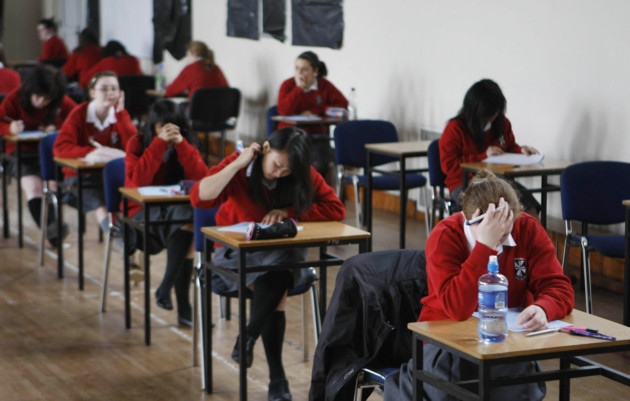MANCHESTER’s not done me too badly.
...just because an area or a school is considered affluent it doesn’t mean they won’t see eating disorders, or self-harm or a lack of self-esteem in its girls.
I’m a by-product of South Manchester, Old Trafford via Moss Side, so yes, a propa’ inner-city Manc girl, made of strong stuff, chips and gravy.
So, while I’ve tampered with the accent, it has most certainly stuck with me.
And on my story goes...
Head girl of the local Catholic high school who did the right thing and got good grades, gaining an internship at the local newspaper, maybe got pissed once or twice in Longford Park, rolled up her school skirt a little short but managed to not get knocked up.
I did okay. More than ok actually, at a time when doing ‘okay’ was all that was expected of a working-to middle class girl of ethnic minority.
At least that's the way I felt. I never once thought that where I was from was providing stumbling blocks to my own success and personal fulfilment. I’ve always felt Manchester helped ‘make me’.
But according to a new report, Manchester isn’t doing enough for its girls. This week, Plan International UK and The University Of Hull revealed Manchester as one of the worst cities for girl’s rights in the UK, ranking a worrying 344 out of 346 cities.
“If you grow up in Waverley, Rushcliffe or Chiltern your outcomes as a girl are likely to better than if you grow up in Middlesbrough, Blackpool or Manchester,” claims the study, which examined each city relative to child poverty, life expectancy, GCSE results and youth unemployment.
The report also revealed girls were facing sexual harassment, sometimes on a daily basis, while the pressure to have a perfect body and the growing problem of cyber-bullying was piling on additional stress.
 Manchester the worst place for girls?
Manchester the worst place for girls?These are extremely pertinent issues for young girls everywhere, regardless of postcode. Though, as to be expected, it was the inner city urban areas that were most at risk. But how was being Mancunian making the young girl experience more difficult than elsewhere – is the city not actively seeking girl’s rights?
“How can you compare Blackpool, where there are wider pockets of deprivation, to a suburb in say Buckinghamshire? There’s really no comparison,” says Jane Kenyon from Manchester-based organisation, Girls Out Loud.
“In areas where there are more instances of poverty like Salford and Greater Manchester, you’ll find girls who come from three to four generations of working class. They tend to have no immediate role models and as a result no real aspirations outside of what they know. They’ve never met female engineers, businesswomen, journalists etc., so they tend to turn to reality TV for role models instead. A lot of this issue has to do with social mobility and a lack thereof,” Jane explains.
“Yet just because an area or a school is considered affluent it doesn’t mean they won’t see eating disorders, or self-harm or a lack of self-esteem in its girls. It will simply manifest itself differently,” she adds.
Jane launched Girls Out Loud seven years ago. It provides schools with targeted confidence building workshops, while offering ‘big sister’ mentors and role models to teenage girls in Manchester, especially for those who are the most vulnerable.
As the report states, ‘there are many strong links between poverty and gender... women and girls can suffer from economic dependence and become more vulnerable to abusive relationships if they do not have the funds to leave’.
Sadly, Manchester helps to reinforce this theory. Recent polls by the Greater Manchester's Poverty Monitor show the chasm between the city's poorest and richest areas is increasing. Additionally, Manchester also displays some of the highest rates of domestic violence in the Plan International UK survey with 3.3 per 1,000 girls in the city having experienced violence.
So is the news shocking to Jane?
“No we tackle this every day. A lot of people can be in denial. When I tell people one in four girls will self-harm, suicide in young girls is on the rise and by age ten 80% of girls will put themselves on a diet, they can’t believe it. How many times can girls tell us that they’re unhappy before we do something about it?”
 (credit: Girls Out Loud)
(credit: Girls Out Loud)Young women’s preoccupation with body image, a lack of confidence and self-esteem featured heavily in the study, as well as the pressure to have sex and sexual harassment in schools.
It’s not an unfamiliar story. Everyday we read stories, perpetuated in the media, about women’s relationships with their bodies. Women’s body parts – whether they’re being lusted after or lambasted in tabloids – are continually exposed, critiqued and exploited and that is the norm we’ve become accustomed to. As we age we forget how much this can have a negative effect on a teen girl, as well as the young men who may grow to view women as objects as a result.
“Schools are over-sexed,” says Jane. “Young people have an easy access to mainstream porn and get all their sexual information from porn. Young people don’t need us to tell them the ‘how-tos’ anymore. Sex-ed is still an embarrassment in this country, we don’t do it justice and it becomes a bit of a farce. We don’t teach about consent. We don’t teach about sex and intimacy, about relationships – and that’s where both boys and girls will suffer as a result.
“The key message here is that we’re all responsible," she adds. "If we, as women, put up with endemic sexism then why wouldn’t they? It’s not just the government and local authorities, we all have to be vigilant to change things.”
The Plan International UK charity is calling for a six-point action plan to progress girls' rights across the UK - and Girls' Rights Champions to be appointed at national, devolved and local levels.
Here in Manchester, Didsbury councillor John Leech, said: "These statistics are deeply concerning and must be tackled immediately.
"We must ensure that we are providing adequate education and support, and we absolutely must work even harder to ensure the safety of girls in Manchester is significantly and quickly improved.”
Improving young girl’s lives in Manchester and beyond is an all-encompassing issue and will require action from local authorities, schools and at home.
After speaking with Jane, I remember my high school and teenage experience a little more clearly. I largely hated it, the relentless bullying and just how consumed I was with my image and being accepted.
Yet it was here in Manchester where I found opportunity, a voice and the gusto to be able to do something with myself, in spite of my M16 postcode and social standing. All it took was a little guidance and a great deal of self-belief. All girls deserve that.
A great quote from the report comes from Isabel, twelve, who says: "A good place to live is a place where you have freedom and you can go to work or school or stay at home, if you want, and you can marry who you want to marry.”
That seems about right.
See the full Plan International UK report here, or learn more about Girls Out Loud on the website.
 Powered by Wakelet
Powered by Wakelet















